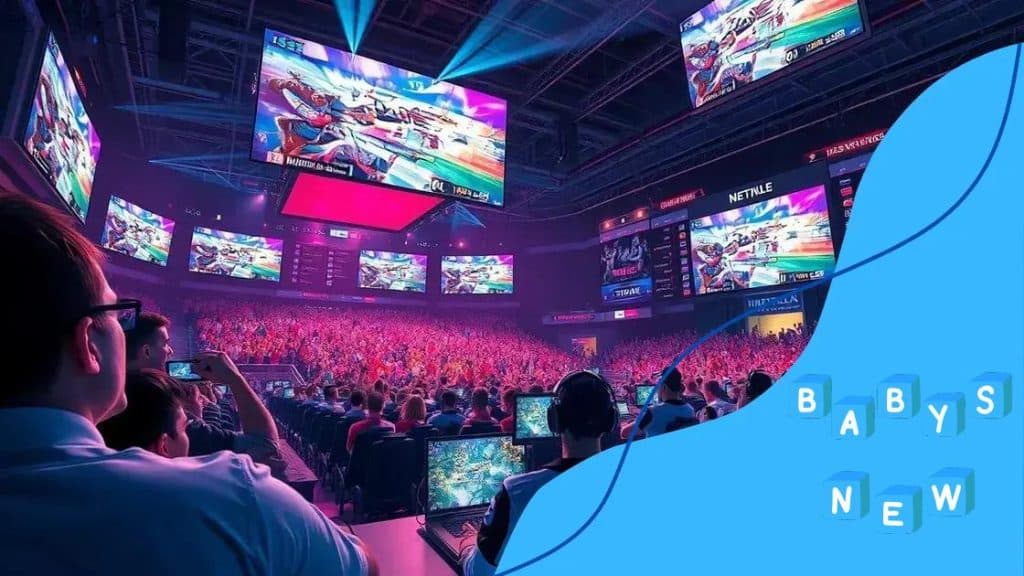How e-sports are influencing mainstream media content

Advertisement
How e-sports are influencing mainstream media content involves their growing integration into traditional media, the rise of influencers, and innovations in technology, all reshaping audience engagement and entertainment experiences.
How e-sports are influencing mainstream media content is a fascinating topic. Have you ever noticed how video games are no longer just games? They’ve become a major force in our entertainment landscape, captivating audiences worldwide.
The rise of e-sports in popular culture
The emergence of e-sports has become a significant part of our popular culture. As more people engage with video games, we see a remarkable shift in how they are perceived. This transformation has led to e-sports gaining recognition not just as a pastime but as a professional sport.
Over the past decade, the popularity of e-sports has soared, capturing the attention of millions worldwide. Major tournaments, attracted large audiences, both online and in-person, making it feel like attending a traditional sports event. The involvement of big brands and sponsorship deals further legitimizes e-sports as a key player in the entertainment industry.
Advertisement
The impact of streaming platforms
One of the most influential factors has been the rise of streaming platforms where players showcase their skills. Twitch and YouTube Gaming have become household names, allowing fans to watch their favorite players compete in real-time.
- Accessible viewing for anyone with an internet connection.
- Interactive features that allow fans to engage with streamers.
- Community building around games and players.
These platforms have not only popularized e-sports but also transformed how we think about entertainment. Viewers can connect with players on a personal level, leading to strong fanbases and community loyalty.
Traditional media’s role
As e-sports have surged, traditional media outlets are taking notice. Many have begun to dedicate airtime to e-sports competitions, showcasing their significance in our media landscape. News outlets cover major events, and sports channels now feature e-sports tournaments in their programming.
Advertisement
This shift illustrates how e-sports are influencing our viewing habits, blurring the lines between traditional sports and gaming culture. With vast audiences tuning in, advertisers are keen to capitalize on this growing market, further intertwining e-sports with mainstream media.
The rise of e-sports in popular culture is undeniable. It reflects a changing landscape where gaming is embraced not just as entertainment but as a significant cultural phenomenon.
How e-sports are changing media consumption habits
E-sports are revolutionizing the way we consume media. As these competitive gaming events grow in popularity, viewers are shifting their preferences, leading to new trends in media engagement. Today, watching players compete in e-sports tournaments is becoming as common as cheering for traditional sports teams.
Streaming platforms play a huge role in this transformation. Fans can watch live events, interact with streamers, and engage in real-time discussions. This level of interaction makes viewing much more exciting than passive watching.
Impact of mobile gaming
With the rise of mobile gaming, e-sports have become even more accessible. Players can compete on their phones, leading to larger audiences. Major tournaments often include mobile games, widening their reach to fans who may not own gaming consoles or high-end PCs.
- Increased accessibility for casual gamers.
- Broader demographic appeal.
- Opportunities for emerging gamers to showcase their skills.
This accessibility also encourages more people to follow e-sports. Fans can easily stream tournaments while on the go, ensuring they never miss a match. Their preference for mobile platforms reflects a broader trend of consuming media anytime, anywhere.
Changing advertising strategies
As e-sports capture more viewer attention, advertisers adapt their strategies. Brands are investing heavily in e-sports sponsorships to reach the new generation of consumers. These sponsorships often feature interactive campaigns that invite fans to engage directly with brands.
Advertisers recognize that the traditional marketing methods may not work as effectively with young audiences. Instead, they focus on creating immersive experiences within the gaming world, and this approach makes advertising feel less intrusive.
Overall, the impact of e-sports on media consumption habits is profound. As viewers embrace this new era of entertainment, we can expect ongoing changes in how media is consumed and marketed.
Case studies of media platforms embracing e-sports

Several media platforms have recognized the potential of e-sports and have begun to embrace this phenomenon. Major networks and streaming services now dedicate time and resources to showcase e-sports events, reflecting a shift in content strategy.
One significant case is that of ESPN. This well-known sports network started airing competitive e-sports tournaments, highlighting popular games like League of Legends and Overwatch. Their broadcasts feature expert commentary, player interviews, and in-depth analysis, similar to traditional sports coverage.
Integration with online platforms
Platforms like Twitch are revolutionizing how we experience e-sports. Twitch enables viewers to watch live tournaments, interact with their favorite streamers, and become part of vibrant communities. The platform’s integration of chat features allows for real-time discussions, making the experience more engaging.
- Accessibility for anyone to stream or watch games.
- User-generated content promotes diverse gaming styles.
- Partnerships with big-name brands enhance credibility.
Additionally, YouTube has invested heavily in e-sports by signing exclusive streaming deals with major tournaments. This strategy not only increases viewership but also boosts engagement through related content such as tutorials, highlights, and commentary by popular gamers.
Reaching wider audiences
Another interesting case is how platforms like Facebook Gaming have launched new initiatives to attract e-sports audiences. They host exclusive events and provide tools for community building, encouraging more participation in e-sports. This effort aims to create a space where casual and competitive gamers alike can engage.
The focus on community is key to these platforms’ success. By fostering a sense of belonging, they ensure that viewers not only watch e-sports but also actively participate, further enriching the overall experience.
Through these case studies, it is clear that media platforms are adapting to the growing reality of e-sports. By embracing this trend, they open new avenues for reaching audiences and creating relevant content that resonates with viewers.
The role of influencers in e-sports and media
Influencers play a crucial role in the e-sports arena, bridging the gap between gamers and their audiences. Many gamers have become prominent figures by showcasing their skills and personalities on platforms like Twitch and YouTube. This rise in influence has transformed how e-sports is perceived and marketed.
A significant aspect of their impact is how they engage with fans. Influencers often create relatable content, whether it’s gameplay tutorials or personal vlogs. This connection fosters loyalty among their followers, who feel more invested in their favorite players.
Driving audience engagement
Influencers ignite conversations around e-sports. When a popular player streams a match, thousands participate in live chats, sharing insights and cheering for their favorites. This interactive experience enhances viewer engagement and encourages more people to tune in.
- Building strong community ties through interaction.
- Encouraging healthy competition among fans.
- Providing real-time feedback during gameplay.
This dynamic interaction has made e-sports more exciting, as fans don’t just watch but actively participate in the experience.
The impact on sponsorships and brand partnerships
As influencers gain popularity, brands are eager to partner with them. These collaborations often lead to product endorsements or sponsorships during live streams. When an influencer promotes a gaming product, their audience is more likely to trust the recommendation.
This has prompted companies to rethink their marketing strategies. Instead of traditional ads, they focus on building relationships with influencers to reach targeted audiences in an authentic way. This method not only boosts sales but also promotes brand loyalty.
The influence of these gamers extends even beyond the screen. They participate in events and promotions, shaping the landscape of e-sports culture. Moreover, their involvement in charity events and community projects underscores the positive impact they can make.
The role of influencers in the e-sports ecosystem cannot be understated. They play a vital part in growing the scene, connecting fans and brands while driving the conversation around competitive gaming.
Future trends in e-sports and media integration
The future of e-sports and media integration looks bright, reflecting emerging technologies and changing consumer behaviors. As digital landscapes evolve, both industries will find new ways to intertwine, bringing innovative experiences to fans.
One trend gaining traction is the use of augmented reality (AR) and virtual reality (VR) in e-sports. These technologies can create immersive experiences, allowing fans to feel as if they are part of the action. Imagine watching a match while standing next to your favorite player, experiencing the thrill in a whole new way.
Data analytics and viewer engagement
Another exciting development is the growing use of data analytics to enhance viewer engagement. By analyzing viewer preferences and behaviors, media platforms can personalize content and provide tailored experiences. This approach keeps audiences interested and engaged.
- Customizing broadcasts based on viewer demographics.
- Providing real-time statistics and insights during matches.
- Encouraging interactive voting and predictions among fans.
Incorporating these strategies creates a more dynamic viewing experience and allows fans to connect deeper with their favorite teams and players.
Growth of mobile e-sports
Mobile gaming continues to expand, leading to a rise in mobile e-sports. With more players participating in competitions on their devices, media platforms are adapting content to cater to these users. This shift makes e-sports accessible to a wider audience, further integrating it into mainstream media.
Streaming services are also optimizing their platforms for mobile viewing. This ensures a seamless experience for users on the go, leading to increased viewership numbers. As a result, more brands are eager to engage with mobile audiences through targeted advertising strategies.
The integration of e-sports into mainstream media will likely continue to grow, fueled by technological advancements and the eagerness of fans to engage with content. As these trends develop, we can expect an even more exciting and connected future for both e-sports and media.
The evolution of e-sports has undoubtedly transformed the media landscape. With the integration of new technologies and the rise of influencers, e-sports have become a vital part of mainstream entertainment. Brands, audiences, and players now share a dynamic relationship, fostering community and engagement. As we look ahead, the trends indicate that e-sports will continue to grow, innovate, and inspire, creating exciting opportunities for everyone involved.
FAQ – Frequently Asked Questions about E-sports and Media Integration
How are e-sports influencing mainstream media?
E-sports are gaining popularity and are now featured in major networks, transforming how viewers engage with entertainment.
What role do influencers play in e-sports?
Influencers connect fans with players and brands, enhancing audience engagement through personal interactions and content.
What technologies are shaping the future of e-sports?
Technologies like augmented reality (AR) and virtual reality (VR) are creating immersive experiences for fans and players.
How can brands benefit from e-sports sponsorships?
Brands can reach targeted audiences authentically by partnering with popular e-sports influencers, boosting awareness and loyalty.





